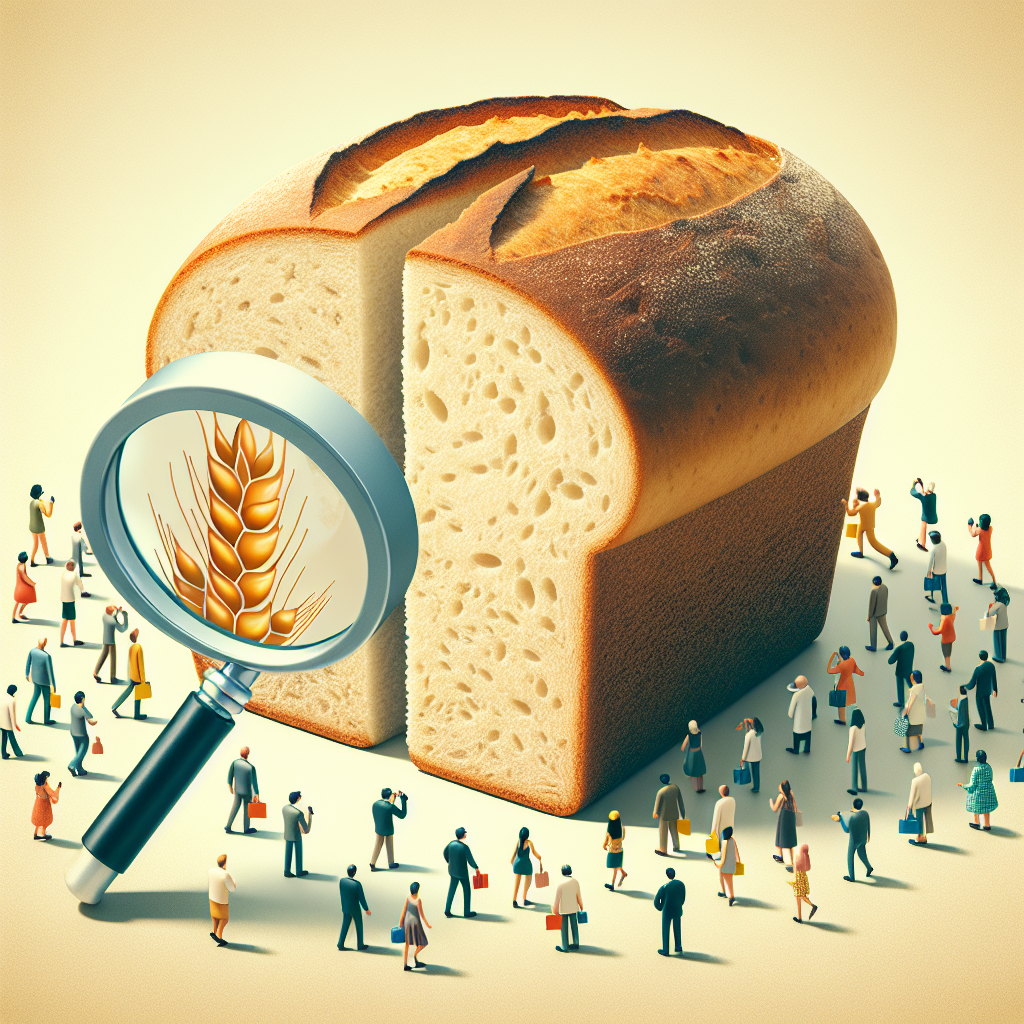Imagine a world where bread is a forbidden pleasure, where pasta is off-limits, and where birthday cake is nothing more than a distant memory. Welcome to the gluten-free movement, a polarizing dietary trend that has taken both the health and culinary worlds by storm. But is this movement truly a necessary lifestyle change, or is it just another passing fad? In this article, we will explore the gluten-free phenomenon, examine its merits and drawbacks, and help you navigate the gluten-deprived path to better understand whether it’s the right choice for you. Get ready to separate fact from fiction and dig into the wheat-free world with an open mind!

What is gluten?
Definition of gluten
Gluten is a group of proteins that are commonly found in grains such as wheat, barley, and rye. It acts as a binder, providing elasticity and giving bread and other baked goods their texture. Gluten comprises two main proteins: glutenin and gliadin. When these proteins come into contact with water, they form a sticky and elastic mass, which is crucial for baking.
Sources of gluten
The primary sources of gluten are wheat, barley, and rye. These grains are widely used in many everyday foods, including bread, pasta, cereals, and baked goods. Gluten can also be found in unexpected places, such as sauces, soups, processed meats, and even some medications. It is important to note that gluten is not present in naturally gluten-free grains like rice, corn, and oats. However, there is a risk of cross-contamination during processing, which can introduce gluten into these otherwise safe products.
Understanding celiac disease
Overview of celiac disease
Celiac disease is an autoimmune disorder triggered by the consumption of gluten. When individuals with celiac disease ingest gluten, their immune system mistakenly attacks the lining of the small intestine, leading to inflammation and damage. This damage hampers the absorption of essential nutrients from food, eventually causing a wide range of symptoms and potentially serious complications. Celiac disease affects approximately 1% of the global population, with varying degrees of severity and manifestations.
Symptoms of celiac disease
The symptoms of celiac disease can vary widely from person to person. Some individuals may experience gastrointestinal issues, such as abdominal pain, bloating, diarrhea, and constipation. Others may suffer from non-gastrointestinal symptoms, including fatigue, joint pain, skin rashes, and even neurological symptoms like depression and migraines. It is important to note that symptoms can be mild or severe, and some individuals may even be asymptomatic. Proper diagnosis is crucial for effective management and prevention of long-term complications.
Testing and diagnosis
Diagnosing celiac disease involves a series of tests and evaluations. Initially, a blood test is conducted to look for specific antibodies associated with the disease. If the blood test indicates the possibility of celiac disease, an endoscopy with a biopsy is performed to examine the lining of the small intestine. The biopsy confirms the presence of damage caused by gluten ingestion. It is important to continue consuming gluten before these tests for accurate results. It is not recommended to start a gluten-free diet before being properly diagnosed, as it can interfere with the accuracy of the tests.
The rise of the gluten-free movement
Exploring the history of the gluten-free movement
The gluten-free movement gained significant momentum in recent years, but its roots can be traced back to the early 20th century. Initially, it was primarily driven by the necessity to provide a safe diet for individuals with celiac disease. As awareness about celiac disease grew, so did the demand for gluten-free products. This surge in demand led to improved manufacturing processes and a wider availability of gluten-free options. The movement expanded beyond those with medical conditions and became a lifestyle choice for many.
Media and celebrity influence
Media and celebrity influence played a pivotal role in the popularization of the gluten-free movement. Celebrities and high-profile figures have publicly embraced gluten-free diets, attributing improved health, weight loss, and increased energy levels to their dietary choices. These endorsements, along with widespread media coverage, have led to a surge in public interest and a perception that a gluten-free diet is beneficial for everyone. However, it is crucial to separate personal anecdotes from scientific evidence when considering the merits of a gluten-free lifestyle.
Market growth and consumer demand
The gluten-free market has experienced exponential growth in recent years, in direct correlation with the rise of the gluten-free movement. Consumer demand for gluten-free products has prompted food manufacturers to develop an extensive range of alternatives to cater to this market. The availability and variety of gluten-free options have expanded significantly, making it easier for individuals with celiac disease and those choosing a gluten-free lifestyle to find suitable alternatives. This market growth has also driven innovation in gluten-free cooking and baking, encouraging experimentation with different grains and techniques.
Fad or necessity: The debate
The argument for gluten-free diets
Proponents of gluten-free diets argue that eliminating gluten can lead to improved digestive health, reduced inflammation, and increased overall well-being. They believe that gluten can be detrimental to health even in the absence of celiac disease, citing anecdotal evidence of improved energy levels and weight loss after adopting a gluten-free lifestyle. Some studies have also shown a link between gluten consumption and certain autoimmune diseases, further supporting the argument for a gluten-free diet for some individuals.
Popular misconceptions about gluten
Despite the growing popularity of gluten-free diets, there are several misconceptions surrounding gluten. One common misconception is that gluten is inherently unhealthy and must be avoided by everyone. This is not the case, as gluten is only harmful to individuals with celiac disease or gluten sensitivity. Another misconception is that a gluten-free diet is superior for weight loss. While some individuals may experience weight loss on a gluten-free diet due to reduced calorie intake or improved food choices, it is not a guaranteed outcome. A balanced and varied diet is key to overall health, regardless of gluten content.

Health benefits and risks of going gluten-free
Improvements in digestive health
For individuals diagnosed with celiac disease, eliminating gluten from their diet is essential for regaining and maintaining optimal digestive health. Once gluten is removed, the inflammation in the small intestine subsides, allowing for proper nutrient absorption. The resolution of symptoms such as abdominal pain, bloating, and diarrhea is a significant benefit. However, it is important to note that individuals without celiac disease or gluten sensitivity do not typically experience improvements in digestive health from going gluten-free.
Weight management and energy levels
Weight loss and increased energy levels are often touted as benefits of a gluten-free diet. While some individuals may experience weight loss and improved energy, it is important to understand the factors contributing to these outcomes. Weight loss on a gluten-free diet may be a result of overall reduced calorie intake due to eliminating certain processed foods. Similarly, increased energy levels could be attributed to better food choices or reduced inflammation in individuals with gluten sensitivity. However, these benefits are not exclusive to a gluten-free diet and can also be achieved through a balanced and varied diet.
Potential nutrient deficiencies
One risk associated with a gluten-free diet is the potential for nutrient deficiencies. Due to the elimination of gluten-containing foods, individuals may rely heavily on processed gluten-free products that are often low in essential nutrients. Whole grains such as wheat contain important nutrients like fiber, B vitamins, and minerals. It is crucial for individuals following a gluten-free diet to ensure they are obtaining these nutrients from alternative sources, such as gluten-free whole grains, legumes, fruits, and vegetables. Consulting a healthcare professional or registered dietitian can help mitigate the risk of nutrient deficiencies.
Increased costs and restrictions
Following a gluten-free diet can be more expensive and restrictive compared to a traditional diet. Gluten-free alternatives often come at a higher price point, and individuals may need to purchase specialty products to replace everyday items like bread and pasta. Additionally, dining out can become challenging due to cross-contamination risks and limited gluten-free options in some establishments. It requires careful planning and adjustment to navigate through social situations and maintain a gluten-free lifestyle without feeling isolated or excluded.
Gluten-free diets and non-celiac individuals
Gluten sensitivity vs. celiac disease
Gluten sensitivity, also known as non-celiac gluten sensitivity, is a condition characterized by an adverse reaction to gluten ingestion. While the symptoms may resemble those of celiac disease, individuals with gluten sensitivity do not experience the same immune system response or intestinal damage. The exact mechanisms and prevalence of gluten sensitivity are still being studied, but it is estimated to affect a small percentage of the population. Unlike celiac disease, gluten sensitivity does not have definitive diagnostic tests, making it challenging to identify.
Understanding non-celiac gluten sensitivity
Non-celiac gluten sensitivity shares some symptoms with celiac disease, including abdominal pain, bloating, and diarrhea. However, it does not cause the same long-term intestinal damage seen in celiac disease. Individuals with gluten sensitivity often report symptom improvement on a gluten-free diet. The management of gluten sensitivity involves observing symptoms after gluten exposure and making dietary adjustments accordingly. It is important for individuals experiencing gluten sensitivity symptoms to consult with a healthcare professional to rule out other potential causes and develop a suitable management plan.
Benefits and drawbacks for non-celiac individuals
For non-celiac individuals, the decision to adopt a gluten-free diet should be based on careful consideration and consultation with a healthcare professional. While going gluten-free may alleviate symptoms in some cases of gluten sensitivity, it is critical to determine whether gluten is the true cause of the symptoms. Some individuals may mistakenly attribute their symptoms to gluten without considering other underlying factors. Additionally, a gluten-free diet can be unnecessarily restrictive, leading to the exclusion of otherwise nutritious foods from the diet. It is important to balance the potential benefits with the drawbacks before embarking on a gluten-free lifestyle.
Navigating a gluten-free lifestyle
Reading food labels and ingredient lists
Navigating a gluten-free lifestyle requires vigilance and attention to detail, particularly when it comes to reading food labels and ingredient lists. Gluten can hide in many processed foods under less common names, such as modified food starch or maltodextrin. It is essential to familiarize oneself with the ingredients to identify potential sources of gluten. Luckily, food labeling regulations have improved, and many products now explicitly state whether they are gluten-free or if they contain any allergens like wheat. Staying informed and reading labels carefully is the key to making safe and informed food choices.
Finding safe gluten-free alternatives
Fortunately, the increasing popularity of the gluten-free movement has led to a wider variety of safe and delicious alternatives. Gluten-free grains like rice, corn, quinoa, and oats (labeled as gluten-free) can be excellent options for incorporating into a gluten-free diet. Additionally, there is a growing market for specialty gluten-free products, including bread, pasta, and baked goods. Experimenting with different recipes and substitutes can help individuals discover tasty alternatives without compromising their dietary needs.
Dining out and social challenges
Social situations, including dining out, can pose unique challenges for individuals following a gluten-free lifestyle. Cross-contamination is a significant concern, as even a small amount of gluten can trigger symptoms in individuals with celiac disease or gluten sensitivity. It is important to communicate dietary needs to restaurant staff and inquire about gluten-free options and preparation practices. Some individuals may choose to bring their own gluten-free food or eat before social gatherings to ensure they have safe options available. Building a support network and educating friends and family about gluten-free needs can also help alleviate social challenges.
Coping strategies for celiac individuals
Support groups and online communities
Celiac individuals often benefit from connecting with others who share similar experiences. Support groups and online communities provide a platform to exchange information, share coping strategies, and find emotional support. These communities offer a sense of belonging and understanding, as well as valuable insights into navigating a gluten-free lifestyle. Interacting with individuals who have successfully managed celiac disease can provide reassurance and practical advice for coping with day-to-day challenges.
Dealing with emotional and psychological aspects
Celiac disease can have emotional and psychological impacts in addition to the physical symptoms. Adjusting to a gluten-free lifestyle, coping with dietary restrictions, and managing social situations can be overwhelming and lead to feelings of frustration, isolation, and anxiety. It is crucial for individuals with celiac disease to prioritize their mental well-being and seek support when needed. Engaging in stress-reducing activities, such as exercise, mindfulness, and hobbies, can help individuals manage the emotional aspects of living with celiac disease.
The importance of professional guidance
Consulting healthcare professionals and dietitians
Given the complexity of gluten-related disorders and the potential health implications, consulting healthcare professionals and registered dietitians is vital. These professionals can provide accurate information, perform appropriate diagnostic tests, and offer personalized dietary advice. They can help identify other potential underlying conditions, provide guidance on nutrient intake, and address individual concerns. A healthcare professional or dietitian can also collaborate with individuals in developing a long-term management plan, ensuring the best possible outcomes.
Getting accurate information and advice
When it comes to gluten-related disorders, it is essential to rely on accurate information from reputable sources. Misinformation and popular misconceptions can lead to unnecessary dietary restrictions or inadequate management of celiac disease or gluten sensitivity. Trusted sources, such as healthcare professionals, dietitians, and established celiac organizations, can provide evidence-based guidance. It is important to approach new information critically and validate claims before making dietary changes. Staying informed and educated is key to making informed decisions regarding nutrition and gluten-related health.
Conclusion
The gluten-free movement has gained significant attention in recent years, with individuals adopting gluten-free diets for various reasons. While the elimination of gluten is necessary for individuals with celiac disease and gluten sensitivity, it is important to differentiate between medical necessity and personal choice. For those diagnosed with celiac disease, strict adherence to a gluten-free diet is crucial for managing symptoms and preventing long-term complications. However, for non-celiac individuals considering a gluten-free lifestyle, it is important to consult with healthcare professionals and consider potential benefits and drawbacks before making dietary changes. As with any major dietary shift, professional guidance, accurate information, and balance are essential to ensure the best outcomes for individuals navigating a gluten-free lifestyle.

